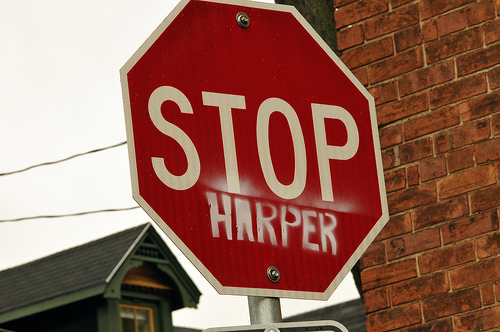Canada is run by a tyrannical prime minister. A majority of Canadians would be happy to see Stephen Harper go. A fair number are working to Stop Harper.
There is no consensus on how to be done with the PM however. If his personal popularity slides far enough down, Stephen Harper may leave of his own accord, or be shown the door by his party. It has happened before. Conservative Prime Minister Brian Mulroney stepped down (before being pushed) knowing he was too unpopular to face the electorate again.
Conservative opponents are not prepared to wait and see if Harper decides to depart, or be sent packing. Hoping is not persuasive policy.
New Democrats, Liberals and Greens want to defeat Stephen Harper. Unsurprisingly, each party has its own idea of how to do it. When asked about political co-operation, only the Greens show any interest.
A divided opposition is seen by commentators such as Paul Saurette as the Conservatives’ great advantage come the next election, expected in 2015.
Lead Now proposes holding primary elections among opposition candidates, in key ridings, to choose a favoured candidate. Both Liberal leadership candidate Joyce Murray and one-time NDP leadership candidate Nathan Cullen have supported this approach.
A one-time, electoral co-operation project, to introduce proportional representation, represents a variation on the Stop Harper theme. For democratic reasons, the electoral system needs changing, since it allows a party gathering votes from as few as one of four eligible voters, to win as many as two-thirds of the House of Commons seats. Change the electoral system, and you eliminate the elected dictator, or so the reasoning goes.
The rise of Harper was facilitated by the ‘unite the right’ initiative. After much back and forth, the Progressive Conservatives joined with the former Reform Party (re-named the Canadian Alliance) to create the Canadian Conservative Party (CPC).
Using the example of the right, an alliance on the left seems to make sense. Why split the centre-left vote?
The problem with this analysis is that the analogy does not hold. The Liberal party are to the left of the Conservatives, but this does not make them left of centre. As party insider Adam Goldenberg states, clearly the Liberals are not a left-wing party. Though Liberals prefer to be known as centrists, with the exception of the 1988 free trade election, on economic issues the Liberals moved to the right after the 1975 election, and have been there ever since.
What excites Liberal organizers around Justin Trudeau is supplanting the Conservatives, including by winning over Conservative voters, not reversing the ideologically driven Harper agenda on the economy.
Liberal partisans are happy to advocate for socially progressive policies on abortion, gay and lesbian issues, immigration or First Nations rights. This distinguishes them from the socially backward positions embraced by the CPC on the same issues, but it does not make Liberals centre-left, only left of the CPC.
The great victory of the right has been to demonize electoral politics, and depreciate the role of government, not advance its social agenda. Making changes to the electoral system would be a plus for electoral democracy. But, the right has to be defeated.
Reversing the demonization of political parties requires civil society groups engage with the political process by pushing opposition parties to adopt a democratic agenda, and embrace open politics. The point is to change government policies. The place to begin is with a full-out campaign against sitting Conservative members.
Defeating Conservative MPs requires on-the-ground action showing the effects of Harper government policies on daily life. Waiting for an election is not the way to do politics. Public opinion formation happens every day.
A minority government would open the door to parliamentary co-operation among the NDP, Liberals, and Greens (so long as the Bloc did not hold the balance of power). The best form of political co-operation would be an accord on policy objectives signed by the opposition parties, followed by a coalition government.
Stop Harper, yes. End the tyranny of the right especially.
Quietly, behind the scenes, major oil and gas interests have come together to develop an energy strategy for Canada. A comprehensive set of proposals has recently been presented to the premiers by the corporate group calling itself the Energy Policy Institute of Canada.
These big-time players intend to see their billions of investment dollars be given priority in policy-making. Expect them to have sold the Liberals on their plans, privately, already. Traditionally, business groups have supported both Conservatives and Liberals; and lobbied both government and opposition parties.
Energy companies prefer to act out of sight, which is why civil society groups need politics to be done in the open.
Open politics, not waiting for electoral co-operation to emerge, is the best way of defeating the right. Engaging with the opposition parties, and getting agreements on progressive policy needs to be the priority.
Duncan Cameron is the president of rabble.ca and writes a weekly column on politics and current affairs.
Photo: QUOI Media/Flickr



